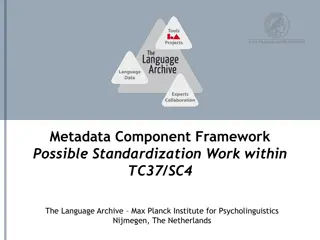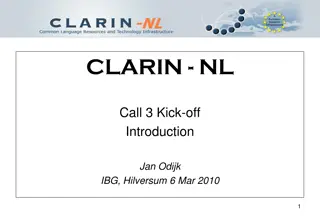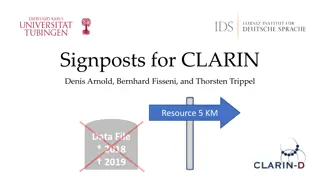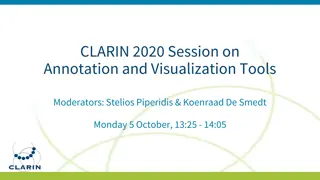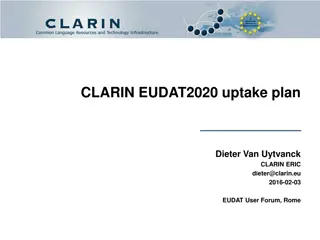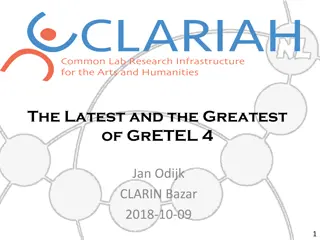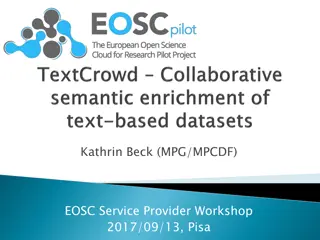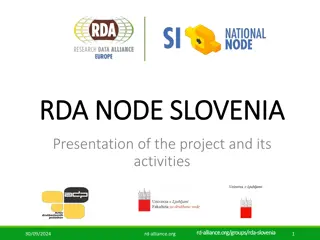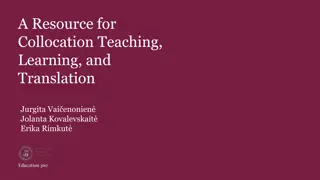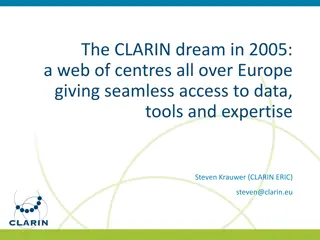Standardization Process for Metadata Components in Language Archives
The standardization process for metadata components within TC37/SC4 at the Language Archive Max Planck Institute involves analyzing existing metadata sets, seeking input from the CLARIN EU community, and determining the next steps for standardization. The process includes forming submission groups,
0 views • 23 slides
Overview of CLARIN-NL Call 3 Projects and Developments
The document provides an overview of the CLARIN-NL Call 3 projects and developments, including information on submissions, awarded projects, disciplines covered, distribution by prioritized disciplines, and subdisciplines of linguistics. It details the open and closed calls, selected disciplines, an
0 views • 28 slides
Insights into Long-Term Archiving Challenges for Large Corpora
Delve into the complexities of preserving and managing large corpora data through Signposts for CLARIN and related resources. Explore topics such as data alterations, format conversions, and virtual collection frameworks. Further reading offers in-depth insights from experts on addressing challenges
1 views • 11 slides
Innovative Tools and Approaches in Language Annotation and Visualization at CLARIN 2020
Presentations at CLARIN 2020 Session focused on annotation and visualization tools, including a neural syntax annotator for Dutch and German, exploring and visualizing Wordnet data with GermaNet Rover, named entity recognition for distant reading in ELTeC, and the semi-automatic analysis of spontane
0 views • 10 slides
Overview of CLARIN - European Research Infrastructure for Language Resources and Technology
CLARIN is a distributed architecture providing scholars in humanities and social sciences with access to digital language data and advanced tools. With 33 member centres across Europe, CLARIN offers services for accessing language resources, processing applications, depositing services, and metadata
0 views • 18 slides
Latest Developments in GrETEL: An Overview of CLARIN, DARIAH, and CLARIAH Projects
GrETEL, a linguistic research tool, showcases the latest advancements in the field of humanities research, particularly within the CLARIN, DARIAH, and CLARIAH projects. It offers functionalities for linguistic research, treebank searching, and user-generated corpus analysis. The tool continues to ev
0 views • 30 slides
Workshop on EOSC Service Provider Challenges and Solutions in Pisa
Workshop held in Pisa addressing challenges and solutions for EOSC service providers in the realm of Social Sciences, Humanities, and Cultural Heritage. Discussions revolved around fragmented research landscapes, text-based datasets, linguistic annotations, and machine learning models for NLP tools.
0 views • 17 slides
RDA Node Slovenia Project Overview
The RDA Node Slovenia project serves as a central contact point between the Research Data Alliance and stakeholders in Slovenia. The project aims to coordinate infrastructure development based on international standards, promote data sharing culture, and engage stakeholders in scientific domains. Ac
0 views • 11 slides
A Resource for Collocation Teaching, Learning, and Translation in Lithuanian
This resource focuses on collocations in Lithuanian, covering topics such as identification and selection of collocations, cross-cultural language variation, translation issues, and available language resources and tools. It offers materials for language teaching, translation studies, and linguistic
0 views • 16 slides
Exploring the CLARIN Dream: Language, Data, and Expertise Across Europe
The CLARIN project, initiated in 2005, aims to provide seamless access to data, tools, and expertise through a network of centres across Europe. By leveraging interoperability standards, researchers can consult catalogues, access text collections, and analyze linguistic resources from various countr
0 views • 5 slides
